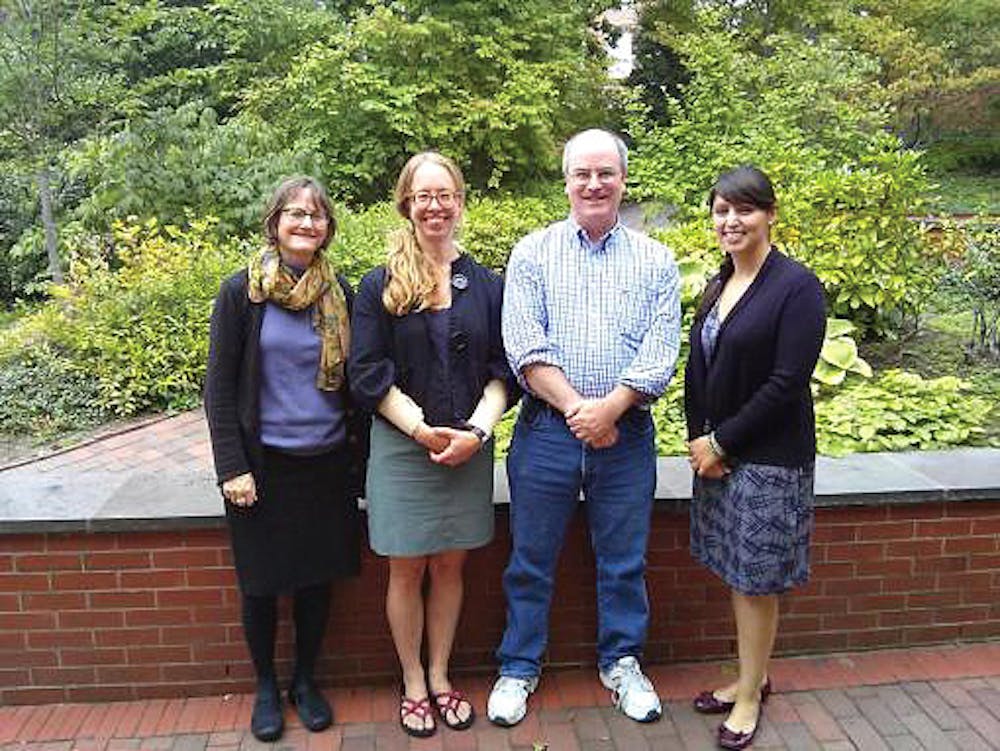Four professors and two Providence community members will receive support for research tied to public engagement as the inaugural recipients of the Public Humanities Fellowship for the 2014-2015 academic year, according to a University press release this month.
The fellowship provides recipients with a $1,500 research fund and research assistance from a graduate student. Over the course of the year, the fellows will come together as a community to engage in discussions, luncheons and presentations.
The fellows will focus on their own projects, with topics including remembrance of violence against Mexican-Americans in southern Texas and development of an app that allows users to take a virtual tour of Brown architecture.
The professors in the inaugural class of fellows are Professor of English Jim Egan, Assistant Professor of History Jo Guldi, Assistant Professor of American Studies Monica Martinez and Professor of the History of Art and Architecture Dietrich Neumann.
Though the professors’ projects are very different, they all use the humanities to make important statements on societal and cultural issues, said Susan Smulyan, professor of American studies and director of the John Nicholas Brown Center for the Public Humanities and Cultural Heritage. These projects are interesting both to students studying these topics and to broader audiences outside of the classroom, she added.
Though the center has offered past fellowship programs and initiatives involving faculty members, there has never been a program that brought the two together, Smulyan said. “My goal for my first year as director was to integrate faculty and their research into the life of the center,” she said.
Guldi is using the fellowship to develop a walking tour of foreclosures in Providence. While much of history is taught “top from bottom,” walking tours allow for an interactive, non-hierarchal discussion of history, she said.
For Egan, a mutual exchange of information with other fellows is the most exciting aspect of the fellowship. He is in the process of writing a book on the history of American literature before 1783. “Since my past work has been generally pitched to an almost entirely scholarly community, I was hoping to get help from the other fellows on how to pitch that work to a broader community,” he said.
Recipients of the fellowship expressed mixed reactions over the $1,500 research fund.
The sum is not substantial and is not a key part of the fellowship, Egan said.
But Christina Bevilacqua, director of program and public engagement at the Providence Athenaeum and a recipient of the fellowship, said the research fund will be extremely helpful to the Athenaeum, given its status as a small nonprofit that is constantly fundraising.
Bevilacqua said she was thrilled when she found out she would have access to a graduate student who had experience in media and different platforms of communication, because the Athenaeum is creating an online archive of its reading and research. “Having a research assistant was something I would never have the budget for,” she said.
The research funds come from the center’s budget, Smulyan said. “We would like to make the budget greater, but that is something we are still working out.”
One of the main challenges of the fellowship is the busy schedules of the recipients, Smulyan said. “Public humanities projects tend to become secondary to research papers or article writing,” she said. “We want to give them enough support, so that they feel like they have the time to finish these projects.”
Since this was the first year the fellowship was offered, the application process was informal and not competitive — everyone who applied won a spot in the inaugural class of fellows, Smulyan said.
Looking ahead, the application process will likely become more formal next year, Smulyan said. “I want to play the role of a salesman rather than a doorkeeper,” she said, adding that the goal of the fellowship is to support the faculty and their projects, not to burden them with a long application process.

ADVERTISEMENT




